Are you a seasoned Biometrics Experimentalist seeking a new career path? Discover our professionally built Biometrics Experimentalist Resume Template. This time-saving tool provides a solid foundation for your job search. Simply click “Edit Resume” to customize it with your unique experiences and achievements. Customize fonts and colors to match your personal style and increase your chances of landing your dream job. Explore more Resume Templates for additional options.

David Hayes
Biometrics Experimentalist
Summary
I am a highly qualified and experienced Biometrics Experimentalist. I have 10+ years of experience in the field and have a strong track record of success. I am proficient in a variety of biometric technologies, including fingerprint recognition, iris recognition, and facial recognition. I have also developed new methods for testing and evaluating biometric systems. I have published my research in top scientific journals and have presented my findings at international conferences. I am also a skilled communicator and have a proven ability to work independently and as part of a team. I am confident that I have the skills and experience necessary to be successful in this role.
Education
Master’s Degree in Computer Science
June 2015
Skills
- Biometric Data Analysis
- Biometrics Hardware Interfacing
- Fingerprint Recognition Algorithm Development
- Iris Recognition System Development
- Biometric Fusion and Multimodal Biometrics
- Biometric Spoof and Liveness Detection
Work Experience
Biometrics Experimentalist
- Supervised and mentored junior researchers
- Managed a team of engineers to develop a new biometric system
- Raised $1 million in funding for a new biometric startup
- Won the prestigious Biometrics Research Award
Biometrics Experimentalist
- Designed and executed experiments to evaluate the accuracy and robustness of fingerprint recognition algorithms
- Developed new methods for testing and evaluating biometric systems
- Collaborated with researchers and engineers to develop new biometric technologies
- Presented research findings at conferences and published papers in scientific journals
Accomplishments
- Successfully implemented a facial recognition system with a false positive rate of less than 0.01%.
- Designed and deployed a biometric authentication system that reduced login time by 50%.
- Developed an algorithm that improved the accuracy of voice recognition systems by 15%.
- Implemented a biometric security solution that reduced fraud losses by 20%.
- Developed a biometric identification system that reduced processing time by 60%.
Awards
- Recipient of the Biometric Industry Innovation Award for developing a novel iris recognition algorithm.
- Recognized with the Excellence in Biometrics Research Award for contributions to the field of fingerprint analysis.
- Awarded the Biometrics Research Institute Fellowship for outstanding research in biometric data fusion.
- Received the Biometric System Excellence Award for developing a mobile biometric authentication platform.
Certificates
- Certified Biometrics Professional (CBP)
- International Association for Identification (IAI) Certified Latent Print Examiner
- Certified Forensic Biometrics Analyst (CFBA)
- ANSI/NIST ITL Certified Biometrics Evaluator
Career Expert Tips:
- Select the ideal resume template to showcase your professional experience effectively.
- Master the art of resume writing to highlight your unique qualifications and achievements.
- Explore expertly crafted resume samples for inspiration and best practices.
- Build your best resume for free this new year with ResumeGemini. Enjoy exclusive discounts on ATS optimized resume templates.
How To Write Resume For Biometrics Experimentalist
- Highlight your experience in biometric technologies.
- Showcase your research skills and publications.
- Demonstrate your ability to work independently and as part of a team.
- Tailor your resume to the specific job you are applying for.
Essential Experience Highlights for a Strong Biometrics Experimentalist Resume
- Design and execute experiments to evaluate the accuracy and robustness of biometric recognition algorithms.
- Develop new methods for testing and evaluating biometric systems.
- Collaborate with researchers and engineers to develop new biometric technologies.
- Present research findings at conferences and publish papers in scientific journals.
- Supervise and mentor junior researchers.
- Manage a team of engineers to develop a new biometric system.
- Raise $1 million in funding for a new biometric startup.
Frequently Asked Questions (FAQ’s) For Biometrics Experimentalist
What is a Biometrics Experimentalist?
A Biometrics Experimentalist is a scientist who designs and conducts experiments to evaluate the accuracy and robustness of biometric recognition algorithms.
What are the different types of biometric technologies?
The most common biometric technologies are fingerprint recognition, iris recognition, and facial recognition.
What are the challenges of biometric recognition?
The main challenges of biometric recognition are accuracy, robustness, and spoofing.
What are the applications of biometric recognition?
Biometric recognition is used in a variety of applications, including access control, time and attendance, and law enforcement.
What is the future of biometric recognition?
Biometric recognition is a rapidly growing field with a bright future. As the technology continues to improve, it will become more accurate, robust, and spoof-resistant.
What are the most important skills for a Biometrics Experimentalist?
The most important skills for a Biometrics Experimentalist are experience in biometric technologies, research skills, and the ability to work independently and as part of a team.
What is the salary of a Biometrics Experimentalist?
The salary of a Biometrics Experimentalist can vary depending on experience, skills, and location. The average salary in the United States is around $100,000 per year.
What are the job prospects for Biometrics Experimentalists?
The job prospects for Biometrics Experimentalists are excellent. The increasing demand for biometric technologies is creating a growing need for qualified professionals.